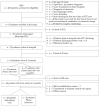Implementation of a Follow-Up Program for Intensive Care Unit Survivors
- PMID: 34639424
- PMCID: PMC8508586
- DOI: 10.3390/ijerph181910122
Implementation of a Follow-Up Program for Intensive Care Unit Survivors
Abstract
In Intensive Care Unit (ICU) survivors, critical illness has an impact on an individual's long-term health status and quality of life. Adults who have recovered from intensive care management could develop muscle weakness, neurocognitive impairment, difficulties in managing activities of daily living and to returning to work, and psychological problems such as depression and anxiety. A prospective, observational study was designed. Data were collected from January to December 2018 from a structured follow-up program, at 3 time points after ICU discharge: at seven days, a visit in the general ward, a phone interview at three months and an ambulatory visit at six months. A total of 95 patients were enrolled, 36% female, with a median age of 65 (55-73) years and a median ICU length of stay of 13 (8-20) days. At the seven days follow-up, patients who had a positive Hospital Anxiety and Depression Scale showed a significantly longer time of intubation (p = 0.048) and length of ICU stay (p = 0.023). At three months, we observed a significant relationship between a positive Hospital Anxiety and Depression Scale and a median value of EuroQol-5D (p = 0.048). At six months, we observed that patients who had a positive Post-Traumatic Symptom Scale were significantly younger than the other group. Findings from the present study suggest that a longer time of intubation and length of ICU stay are associated with a higher level of anxiety and depression immediately after ICU discharge. Follow-up programs are recommended to assess and rehabilitate cognitive function at ICU discharge.
Keywords: 6-min walking test; ICU survivors; follow-up; health related quality of life; post-traumatic stress disorder.
Conflict of interest statement
The authors declare no conflict of interest.
Figures
References
-
- Nates J.L., Nunnally M., Kleinpell R., Blosser S., Goldner J., Birriel B., Fowler C.S., Byrum D., Miles W.S., Bailey H., et al. ICU Admission, Discharge, and Triage Guidelines: A Framework to Enhance Clinical Operations, Development of Institutional Policies, and Further Research. Crit. Care Med. 2016;44:1553–1602. doi: 10.1097/CCM.0000000000001856. - DOI - PubMed
-
- Pandharipande P.P., Girard T.D., Jackson J.C., Morandi A., Thompson J.L., Pun B.T., Brummel N.E., Hughes C.G., Vasilevskis E.E., Shintani A.K., et al. BRAIN-ICU Study Investigators. Long-term cognitive impairment after critical illness. N. Engl. J. Med. 2013;369:1306–1316. doi: 10.1056/NEJMoa1301372. - DOI - PMC - PubMed
Publication types
MeSH terms
LinkOut - more resources
Full Text Sources
Medical


